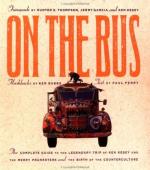|
This section contains 5,946 words (approx. 20 pages at 300 words per page) |

|
SOURCE: Safer, Elaine B. “The Absurd Quest and Black Humor in Ken Kesey's Sometimes a Great Notion.” Critique 24, no. 4 (summer 1983): 228-40.
In the following essay, Safer delineates the absurdist perspective and black humor tone of Sometimes a Great Notion.
Ken Kesey's One Flew over the Cuckoo's Nest (1962) has been acclaimed as a premier example of black humor literature, while Sometimes a Great Notion (1963) has received relatively little critical attention, most of it negative. Commentators have faulted Kesey's second novel for having “quirky and hallucinatory” images, characters who engage in a “self-defeating struggle,” and—in general—for being too diffuse, for having no central unity.1 An absurdist thrust and black humor tone, similar to those in One Flew over the Cuckoo's Nest, give coherence and compelling power to Kesey's long second work and cause Sometimes a Great Notion to be a major contribution to contemporary American literature.
The story...
|
This section contains 5,946 words (approx. 20 pages at 300 words per page) |

|


